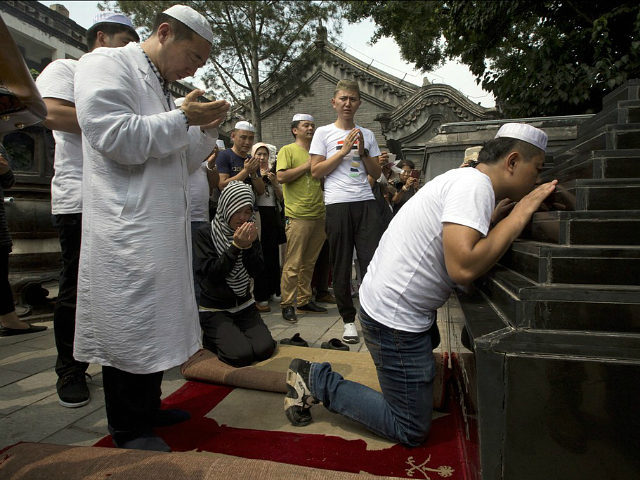A column in the Chinese state-run newspaper the Global Times quotes political experts warning that “religious extremism” — defined as any religious observance from Islam to Christianity to the Falun Gong group — has become a dire threat to Chinese Communism, and regulation of the internet is key to stopping it.
The column highlights statements from Chinese and Singaporean “experts” speaking at a conference in Shanghai on extremism, called “Religious extremism and heresy in a pluralistic society.” While the most prominent concern among experts was the spread of radical Islam, particularly among China’s Uighur ethnic minority, all religions were treated as a threat to communist society, and the Chinese government has intensified its aggression towards a variety of religious leaders.
“Religious extremism is spreading in China faster than before, and its impact is greater than ever, affecting Chinese cities and even students on campus,” the article cited the experts as noting.
Some — such as Yan Kejia, president of Shanghai Association of Religious Studies — cited the Falun Gong movement as a particular religious threat to China as they “take away their followers’ money, brainwash their followers and commit other anti-rational, anti-social deeds.” The Falun Gong is a spiritual movement that teaches its followers to meditate and disconnect from the political world regularly, as well as opposing many medical procedures; studies suggest the Chinese government has been using Falun Gong prisoners as forced organ donors by the thousands for years.
Ge Zhuang, Vice President of Shanghai Association of Religious Studies, focused on Islam, warning that women in the western Uighur region are particularly susceptible to radicalization, though the Global Times does not specify why. Ge recommends “strict” supervision of internet use as a solution to Islamic radicalism.
A Singaporean guest, identified as Doctor Rozlan Giri, noted that, while Singapore’s government has taken full control of Islamic education, “the Internet is a big challenge as young people are exposed to social media.” “We can regulate it, but not totally,” he laments.
A Singaporean ambassador, Mohammad Alami Musa, posited that religion itself, not just Islam, is the problem: “Religion has come back. It has come back in a big way.”
The conference occurred shortly after the Chinese government announced new anti-terrorism legislation in Xinjiang, the western Uighur region. “Under the new regulation, which took effect on Monday, people who expand the concept of halal in Islam – which means adherence to dietary laws – to include other areas of life will face detention and fines,” China Daily reports.
The law essentially bars Muslims from following sharia law outside of their diet; Muslim Sharia law encompasses all aspects of life, from family and finance to diet, hygiene, and government. The new law also imposes harsher punishments on those “using cellphones, internet, video or audio files or publications to spread terrorism and extremism,” as defined by the Chinese communist government.
The Chinese government has reason to fear radical Islam. The Islamic State has actively attempted to court Chinese nationals, releasing propaganda in Mandarin — a language Uighurs typically do not speak — and taunting Chinese “atheists” with a Muslim invasion. They have succeeded in recruiting at least 144 Uighur Chinese, though the Chinese government claims the number traveling to Syria and Iraq to join ISIS is closer to 300.
In response, Xinjiang has passed numerous regional anti-Islamic laws, including banning Chinese Communist Party members from engaging in the Ramadan fast to banning burqas in public and any Islamic garb on public transportation.
China’s religious restrictions have not ended there, as it has expanded the Islamic State threat by attempting to equate other religious leaders to the terrorist group. Notably, Chinese officials have accused the Dalai Lama of being an Islamic State agent, thus granting them moral license to persecute his Buddhist followers.
While unable to tie them to radical Islam, the Chinese government has also intensified its crackdown on Christians. On Wednesday, Chinese state-run outlet Xinhua reported that a Chinese church leader, Hu Shigen, would be serving seven years in prison for “counter-revolutionary” activities. Hu had spent 14 years in prison for the same crime: ministering to Chinese Christians. In a forced confession, Hu said he had “long been influenced by bourgeois liberalism” and fallen “deeper and deeper in to the criminal mire of anti-Party and anti-government groups.”
In February, China arrested Gu Yuese, the leader of the nation’s first megachurch. It has also targeted individual churches, forcing public Christian locations to take down their crosses and beating Christians who publicly displayed their faith.

COMMENTS
Please let us know if you're having issues with commenting.